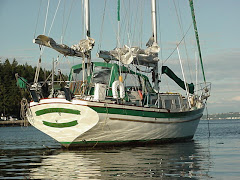Why do they happen so frequently in the winter? Because (up here in the north, anyway), it is in the winter when the boat's electrical system is most taxed, keeping the boat warm.
It is the combination of high resistance connections and heavy current load which is the problem. Ohm's Law, one of the most basic electrical principles says in one of its forms:
P=I2R
Where P is the power or heat generated in watts, R is the resistance in ohms and I is the current in amps passing thru that resistance. What this means is that the heat generated at a bad connection is powerfully related to the current being passed thru that bad connection.Here's a visualization. Have you ever changed out a 100 watt light bulb that just burned out? It was way, way too hot to touch, right? Incandescent lights deliver about 97% of their output as heat and only 3% as light (thus the push behind CFLs and LEDs). So now you have some idea of what 100 watts worth of heat is like - its a lot. Now let's consider a 30 amp shore power connector that has gotten salt water on it and is a little corroded. If that corrosion causes only 0.1 ohm of resistance in the connection, the amount of heat generated in the tiny volume where the two pieces of metal in the connector touch will be: 30 x 30 x 0.1 = 90 watts.
As bad as that is, it is not the end of the situation. In the female side of the connection, the connection is made by a springy contact pair which wedges apart when the male end is inserted. The heat takes the temper out of these spring contacts, making the poor connection even worse. In fact, this can snowball, leading almost inevitably to this:
 |
| Uh oh... |
By the way, the marina end of the power cord and the connector in the marina's power box are also candidates for failure - you should check that end too.
Tho the shore power connection seems to be a common failure point, every electrical connection in the boat's wiring is a candidate too. There are too many of these for me to call them out individually. But if any electrical connection down below gets hot or shows signs of having been hot, repairs are in order. Bad connections make heat, and heat makes bad connections worse.
When doing a general inspection, check the connections that carry the most current first - and yes, this does indeed mean that the 12V connections are a bigger risk than the 110V connections. Remember, the heat generated is as the square of the current, and the highest current connections on your boat are likely to be the 12V ones.











1 comment:
Wow - Thanks Bob. I didn't know those shore-power connections were so vulnerable, nor so prone to failure. Nor did I realize the damage would be systemic as a result of one connection failure.
Post a Comment